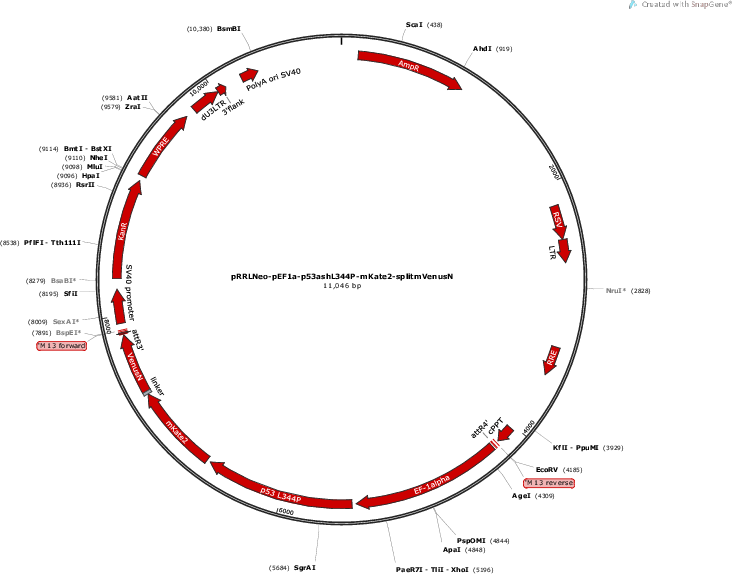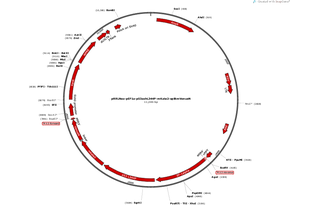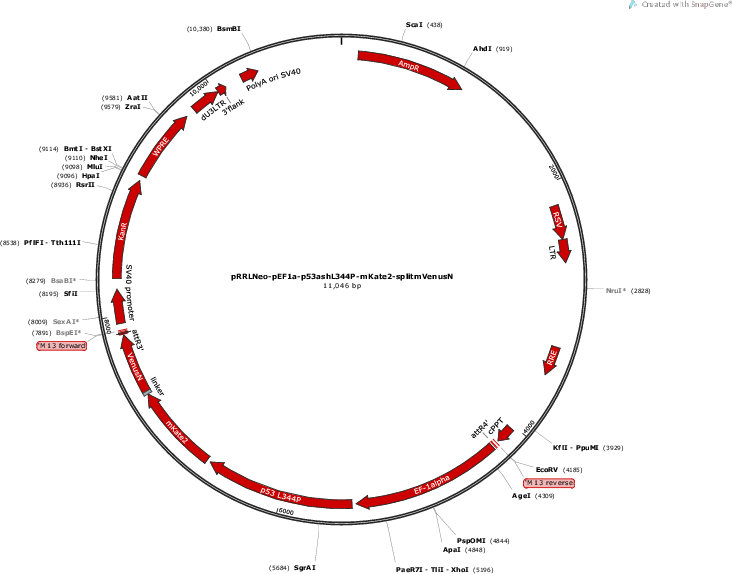pRRLNeo-pEF1a-p53ashL344P-mKate2-splitmVenusN
(Plasmid
#69586)
-
PurposeExpresses mutated p53-L344P tagged with mKate2 and split N-term mVenus
-
Depositing Lab
-
Sequence Information
Ordering
| Item | Catalog # | Description | Quantity | Price (USD) | |
|---|---|---|---|---|---|
| Plasmid | 69586 | Standard format: Plasmid sent in bacteria as agar stab | 1 | $85 | |
Backbone
-
Vector backbonepRRL
- Backbone size w/o insert (bp) 7429
- Total vector size (bp) 11046
-
Modifications to backboneneomycin resistance
-
Vector typeMammalian Expression, Lentiviral
-
Selectable markersNeomycin (select with G418)
Growth in Bacteria
-
Bacterial Resistance(s)Ampicillin, 100 μg/mL
-
Growth Temperature37°C
-
Growth Strain(s)Stbl3
-
Copy numberLow Copy
Gene/Insert
-
Gene/Insert namep53-L344P
-
SpeciesH. sapiens (human)
-
Insert Size (bp)1179
-
Mutationp53 L344P mutation that prevents dimerization and tetramerization and 7 silent mutations in p53 DNA to prevent targeting by shRNA at positions C777T, T778A, C779G, A781T, G782C, T786A, T789C
-
Entrez GeneTP53 (a.k.a. BCC7, BMFS5, LFS1, P53, TRP53)
- Promoter EF1alpha
-
Tags
/ Fusion Proteins
- mKate2 (C terminal on insert)
- split mVenus - N term (C terminal on insert)
Cloning Information
- Cloning method Gateway Cloning
- 5′ sequencing primer CAAGTTTGTACAAAAAAGCAGGCT (Common Sequencing Primers)
Terms and Licenses
-
Academic/Nonprofit Terms
-
Industry Terms
- Not Available to Industry
Trademarks:
- Zeocin® is an InvivoGen trademark.
Depositor Comments
This mutant will not dimerize nor tetramerize. This p53 is tagged with the N-term of a split mVenus. The silent mutations prevent targeting by shRNA p53 published in Brummelkamp et al Science. 2002;296:550–3.
These plasmids were created by your colleagues. Please acknowledge the Principal Investigator, cite the article in which the plasmids were described, and include Addgene in the Materials and Methods of your future publications.
-
For your Materials & Methods section:
pRRLNeo-pEF1a-p53ashL344P-mKate2-splitmVenusN was a gift from Galit Lahav (Addgene plasmid # 69586 ; http://n2t.net/addgene:69586 ; RRID:Addgene_69586) -
For your References section:
Constant rate of p53 tetramerization in response to DNA damage controls the p53 response. Gaglia G, Lahav G. Mol Syst Biol. 2014 Oct 24;10:753. doi: 10.15252/msb.20145168. PubMed 25344068





